- Home
- Jasper Fforde
The Well of Lost Plots Page 4
The Well of Lost Plots Read online
Page 4
I handed him a pound and he patted his pockets.
'Sorry,' he said, 'have you got anything smaller? I don't carry much change.'
'Keep it,' I told him as his footnoterphone muttered something about a party of ten wanting to get out of Florence in The Decameron. I got a receipt and he vanished from view. I picked up Gran's suitcase and hauled it into the Sunderland.
'This is ibb and obb,' I explained, 'Generics billeted with me. The one on the left is ibb.'
'I'm obb.'
'Sorry. That's ibb and that's obb. This is my grandmother.'
'Hello,' said Granny Next, gazing at my two house guests.
'You're very old,' observed ibb.
'One hundred and eight,' announced Gran proudly. 'Do you two do anything but stare?'
'Not really,' said ibb.
'Plock,' said Pickwick, who had popped her head round the door. She ruffled her feathers excitedly and rushed up to greet Gran, who always seemed to have a few spare marshmallows about her.
'What's it like being old?' asked ibb, who was peering closely at the soft pink folds in Gran's skin.
'Death's adolescence,' replied Gran, 'but you know the worst part?'
ibb and obb shook their heads.
'I'm going to miss my funeral by three days.'
'Gran!' I scolded. 'You'll confuse them – they tend to take things literally.'
It was too late.
'Miss your own funeral?' muttered ibb, thinking hard. 'How is that possible?'
'Think about it, ibb,' said obb. 'If she lived three days longer, she'd be able to speak at her own funeral – get it?'
'Of course,' said ibb, 'stupid of me.'
And they went into the kitchen, talking about Mrs Beeton and the best way to deal with amorous liaisons between the scullery maid and the boot boy – it must have been an old edition.
'When's supper?' asked Gran, looking disdainfully at the interior of the flying boat. 'I'm absolutely famished – but nothing tougher than suet, mind. The gnashers aren't what they were.'
I delicately helped her out of her gingham coat and sat her down at the table. Steak Diane would be like eating railway sleepers to her, so I started to make an omelette.
'Now, Gran,' I said, cracking some eggs into a bowl, 'I want you to tell me what you're doing here.'
'I need to be here to remind you of things you might forget, young Thursday.'
'Such as what?'
'Such as Landen. They eradicated my husband too, and the one thing I needed was someone to help me through it, so that's what I'm here to do for you.'
'I'm not going to forget him, Gran!'
'Yes,' she agreed in a slightly peculiar way, 'I'm here to make sure of it.'
'That's the why,' I persisted, 'but what about the how?'
'I too used to do the occasional job for Jurisfiction in the old days,' she explained, 'a long time ago, mind, but it was just one of many jobs that I did in my life – and not the strangest, either.'
'What was?' I asked, knowing in my heart that I really shouldn't be asking.
'Well, I was God Emperor of the Universe once,' she answered in the same manner in which she might have admitted to going to the pictures, 'and being a man for twenty-four hours was pretty weird.'
'Yes,' I replied, 'I expect it was.'
ibb laid the table and we sat down to eat ten minutes later. As Gran sucked on her omelette I tried to make conversation with ibb and obb. The trouble was, neither of them had the requisite powers of social communication to assimilate anything from speech other than the bald facts it contained. I tried a joke I had heard from Bowden, my partner at SpecOps, about an octopus and a set of bagpipes. But when I delivered the punchline they both stared at me.
'Why would the bagpipes be dressed in pyjamas?' asked ibb.
'They weren't,' I replied, 'it was the tartan. That's just what the octopus thought they were.'
'I see,' said obb, not seeing at all. 'Would you mind going over it again?'
'That's it,' I said resolutely, 'you're going to have a personality if it kills me.'
'Kill you?' enquired ibb in all seriousness. 'Why would it kill you?'
I thought carefully. There had to be somewhere to begin. I clicked my fingers.
'Sarcasm,' I said. 'We'll start with that.'
They both looked at me blankly.
'Well,' I began, 'sarcasm is closely related to irony and implies a twofold view – a literal meaning yet a wholly different intention from what is said. For instance, if you were lying to me about who ate all the anchovies I left in the cupboard, and you had eaten them, you might say: "It wasn't me" and I would say: "Sure it wasn't," meaning I'm sure it was but in an ironic or sarcastic manner.'
'What's an anchovy?' asked ibb.
'A small and very salty fish.'
'I see,' replied ibb. 'Does sarcasm work with other things or is it only fish?'
'No, the stolen anchovies was only by way of an example. Now you try.'
'An anchovy?'
'No, you try some sarcasm.'
They continued to look at me blankly. I sighed.
'Like trying to nail jelly to the wall,' I muttered under my breath.
'Plock,' said Pickwick in her sleep as she gently keeled over. 'Plocketty-plock.'
'Sarcasm is better explained through humour,' put in Gran, who had been watching my efforts with interest. 'You know that Pickwick isn't too clever?'
Pickwick stirred in her sleep where she had fallen, resting on her head with her claws in the air.
'Yes, we know that,' replied ibb and obb, who were nothing if not observant.
'Well, if I were to say that it is easier to get yeast to perform tricks than Pickwick, I'm using mild sarcasm to make a joke.'
'Yeast?' queried ibb. 'But yeast has no intelligence.'
'Exactly,' replied Gran. 'So I am making a sarcastic observation that Pickwick has less brain power than yeast. You try.'
The Generic thought long and hard.
'So,' said ibb slowly, 'how about … Pickwick is so clever she sits on the TV and stares at the sofa?'
'It's a start,' said Gran.
'And,' added ibb, gaining confidence by the second, 'if Pickwick went on Mastermind, she'd do best to choose "Dodo eggs" as her specialist subject.'
obb was getting the hang of it, too.
'If a thought crossed her mind it would be the shortest journey on record—'
'Pickwick would cause a sensation at Oxford – but only from within a specimen jar—'
'All right, that's enough sarcasm,' I said quickly. 'I know Pickwick won't win "Brain of BookWorld" but she's a loyal companion.'
I looked across at Pickwick, who slid off the sofa and landed with a thump on the floor. She woke up and started plocking loudly at the sofa, coffee table, rug – in fact, anything close by – before calming down, climbing on top of her egg and falling asleep again.
'You did well, guys,' I said. 'Another time we'll tackle subtext.'
ibb and obb went to their room soon afterwards, discussing how sarcasm was related to irony, and whether irony itself could be generated in laboratory conditions. Gran and I chatted about home. Mother was very well, it seemed, and Joffy and Wilbur and Orville were as mad as ever. Gran, conscious of my dealings with Yorrick Kaine in the past, reported that Kaine had returned soon after the episode with the Glatisant at Volescamper Towers, lost his seat in the house and been back at the helm of his newspaper and publishing company soon after. I knew he was fictional and a danger to my world but couldn't see what to do about it from here. We talked into the night about the BookWorld, Landen, eradications and having children. Gran had had three herself so she told me all the stuff they don't tell you when you sign on the dotted line.
'Think of swollen ankles as trophies,' she said, somewhat unhelpfully.
That night I put Gran in my room and slept in the bedroom under the flight deck. I washed, undressed and climbed into bed, weary after the day's work. I lay there, staring
at the pattern of reflected light dancing on the ceiling, and thought of my father, Emma Hamilton, Jack Spratt, Dream Topping and babies. I was meant to be here resting but the demolition problem of Caversham Heights couldn't be ignored – I could have moved but I liked it here, and besides, I had done enough running away already. The arrival of Gran had been strange, but since much was odd here in the Well, weird had become commonplace. If things carried on like this the dull and meaningless would become items of spectacular interest.
4
Landen Parke-Laine
* * *
'They say that no one really dies until you forget them, and in Landen's case it was especially true. Since Landen had been eradicated I had discovered that I could bring him back to life in my memories and my dreams, and I had begun to look forward to falling asleep and returning to treasured moments which we could share, albeit only fleetingly.
'Landen lost a leg to a landmine and his best friend to a military blunder. The friend had been my brother, Anton – and Landen testified against him at the hearing that followed the disastrous "Charge of the Light Armoured Brigade" in 1973. My brother was blamed for the debacle, Landen was honourably discharged and I was awarded the Crimea Star for gallantry. We didn't speak for ten years, and we were married two months ago. Some people say it was an unorthodox romance – but I never noticed this myself
THURSDAY NEXT – The Jurisfiction Chronicles
That night, I went to the Crimea again. Not, you might think, the most obvious port of call in my sleep. The peninsula had been a constant source of anguish in my waking hours: a time of stress, of pain, and violent death. But the Crimea was where I met Landen, and where we fell in love. The memories were more dear to me now because it had never happened, and it was for this reason that the Crimea's sometimes painful recollections came back to me. I relaxed and was transported in the arms of Morpheus to the Black Sea peninsula, twelve years before.
No shots had been fired for ten years when I arrived on the peninsula in the May of 1973 although the conflict itself had been going for a hundred and twenty years. I was attached to the 3rd Wessex Tank Light Armoured Brigade as a driver – I was twenty-three years old and drove thirteen tons of armoured vehicle under the command of Major Phelps, who was later to lose his lower arm and his mind during a badly timed charge into the massed Russian artillery. In my youthful naïveté, I had thought the Crimea was fun – a notion that was soon to change.
'Report to the vehicle pool at fourteen hundred hours,' I was told one morning by our sergeant, a kindly yet brusque man by the name of Tozer. He would survive the charge but be lost in a training accident eight years later. I was at his funeral. He was a good man.
'Any idea what I'll be doing, Sarge?' I asked.
Sergeant Tozer shrugged.
'Special duties. I was told to allocate someone intelligent – but they weren't available, so you'll have to do.'
I laughed.
'Thanks, Sarge.'
I dreamed this scene more often these days, and the reason was clear – it was the first time Landen and I spent any time together. My brother Anton was also serving out here and he had introduced us a few weeks before – but Anton did that a lot. Today I was to drive Landen in an armoured scout car to an observation post overlooking a valley in which a build-up of Imperial Russian artillery had been reported. We referred to the incident as 'our first date'.
I arrived for duty and was told to sign for a Dingo scout car, a small two-person armoured vehicle with enough power to get out of trouble quick – or into it, depending on one's level of competency. I duly picked up the scout car and waited for nearly an hour, standing in a tent with a lot of other drivers, talking and laughing, drinking tea and telling unlikely stories. It was a chilly day but I was glad I was doing this instead of daily orders, which generally meant cleaning up the camp and other tedious tasks.
'Corporal Next?' said an officer who poked his head into the tent. 'Drop the tea – we're off!'
He wasn't handsome but he was intriguing, and, unlike many of the officers, he seemed to have a certain relaxed manner about him.
'Good morning, sir,' I said, unsure of whether he remembered me. I needn't have worried. I didn't know it yet, but he had specifically asked Sergeant Tozer for me. He was intrigued too, but fraternising on active duty was a subtle art. The penalties could be severe.
I led him to where the Dingo was parked and climbed in. I pressed the starter and the engine rumbled into life. Landen lowered himself into the commander's seat.
'Seen Anton recently?' he asked.
'He's up the coast for a few weeks,' I told him.
'Ah,' he replied, 'you made me fifty pounds when you won the ladies' boxing last weekend. I'm very grateful.'
I smiled and thanked him but he wasn't paying me any attention – he was busy studying a map.
'We're going here, Corporal.'
I studied the chart. It was the closest to the front lines I'd ever been. To my shame, I found the perceived danger somewhat intoxicating. Landen sensed it.
'It's not as wildly exciting as you might think, Next. I've been up there twenty times and was only shelled once.'
'What was it like?'
'Disagreeably noisy. Take the road to Balaclava – I'll tell you when to turn right.'
So we bumped off up the road, past a scene of such rural tranquillity that it was hard to imagine that two armies were facing each other not ten miles away with enough firepower to lay the whole peninsula to waste.
'Ever seen a Russian?' he asked as we passed military trucks supporting the front-line artillery batteries; their sole job was to lob a few shells towards the Russians – just to show we were still about.
'Never, sir.'
'They look just like you and me, you know.'
'You mean they don't wear big furry hats and have snow on their shoulders?'
The sarcasm wasn't wasted.
'Sorry,' he said, 'I didn't mean to patronise. How long have you been out here?'
'Two weeks.'
'I've been here two years,' said Landen, 'but it might as well be two weeks. Take a right at the farmhouse just ahead.'
I slowed down and cranked the wheel round to enter the dusty farm track. The springs on a Dingo are quite hard – it was a jarring ride along the track, which passed empty farm buildings, all bearing the scars of long-past battles. There was old and rusting armour and other war debris lying abandoned in the countryside, reminders of just how long this static war had been going on. Rumour had it that in the middle of no man's land there were still artillery pieces dating from the nineteenth century. We stopped at a checkpoint, Landen showed his pass and we drove on, a soldier joining us up top 'as a precaution'. He had a second ammunition clip taped to the first in his weapon – always a sign of someone who expected trouble – and a dagger in his boot. He had only fourteen words and twenty-one minutes left before he was to die in a small spinney of trees that in happier times might have been a good place for a picnic. The bullet would enter below his left shoulder blade, deflect against his spine, go straight through his heart and exit three inches below his armpit, whereupon it would lodge in the fuel gauge of the Dingo. He would die instantly and I would relate what happened to his parents eighteen months later. His mother would cry and his father would thank me with a dry throat. But the soldier didn't know that. These were my memories, not his.
'Russian spotter plane!' hissed the doomed soldier.
Landen ordered me back to the trees. The soldier had eleven words left. He would be the first person I saw killed in the conflict but by no means the last. As a civvy you are protected from such unpleasantries but in the forces it is commonplace – and you never get used to it.
I pulled the wheel hard over and doubled back towards the spinney as fast as I could. We halted under the protective cover of the trees and watched the small observation plane from the dappled shade. We didn't know it at the time but an advance party of Russian commandos were pushing toward
s the lines in our direction. The observation post we were heading for had been overrun half an hour previously and the commandos were being supported by the spotter plane we had seen – and behind them, twenty Russian battle tanks with infantry in support. The attack was to fail, of course, but only by virtue of the VHF wireless set carried in the Dingo. I would drive us out of there and Landen would call in an air strike. That was the way it had happened. That was the way it had always happened. Brought together in the white heat and fear of combat. But as we sat beneath the cover of the birch trees, huddled down in the scout car, the only sound the coo of a partridge and the gentle thrum of the Dingo's engine, we knew nothing – and were concerned only that the spotter plane that wheeled above us would delay our arrival at the OP.
'What's it doing?' whispered Landen, shielding his eyes to get a better look.
'Looks like a Yak-12,' replied the soldier.
Six words left and under a minute. I had been looking up with them but now glanced out of the hatch at the front of the scout car. My heart missed a beat as I saw a Russian run and jump into a natural hollow a hundred yards in front of the Dingo.
'Russkie! I gasped. 'Hundred yards twelve o'clock!'
I reached up to close the viewing hatch but Landen grabbed my wrist.
'Not yet!' he whispered. 'Put her in gear.'
I did as I was told as Landen and the soldier twisted around to look.
'What have you got?' hissed Landen.
'Five, maybe six,' the soldier whispered back, 'heading this way.'
'Me too,' muttered Landen. 'Go, Corporal, go!'
I revved the engine, dropped the clutch and the Dingo lunged forward. Almost instantaneously there was a rasp of machine-gun fire as the Russians opened up. To them, we were a surprise ruined. I heard the closer rattle of gunfire as our soldier replied, along with the sporadic crack of a pistol that I knew was Landen. I didn't close the steel viewing hatch; I needed to be able to see as much as I could. The scout car bounced across the track and swerved before gathering speed with the metallic spang of small-arms fire hitting the armour plate. I felt a weight slump against my back and a bloodied arm fell into my vision.

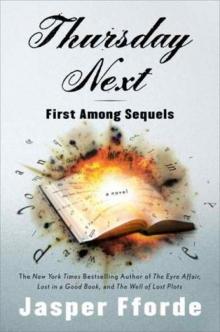 First Among Sequels
First Among Sequels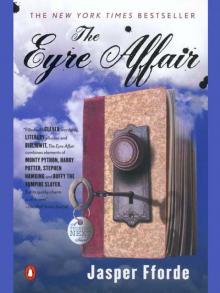 The Eyre Affair
The Eyre Affair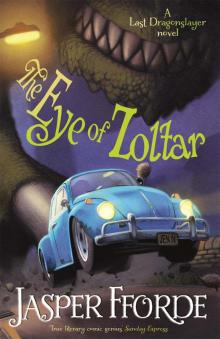 The Eye of Zoltar
The Eye of Zoltar The Woman Who Died a Lot
The Woman Who Died a Lot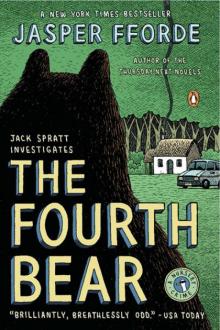 The Fourth Bear
The Fourth Bear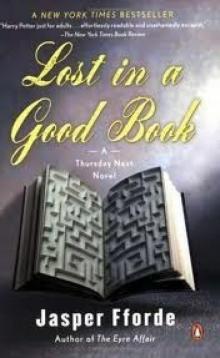 Lost in a Good Book
Lost in a Good Book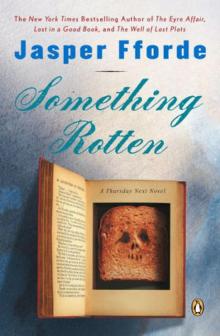 Something Rotten
Something Rotten The Well of Lost Plots
The Well of Lost Plots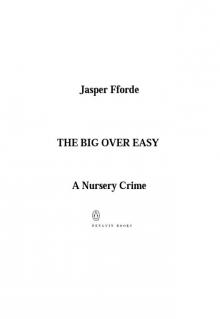 The Big Over Easy
The Big Over Easy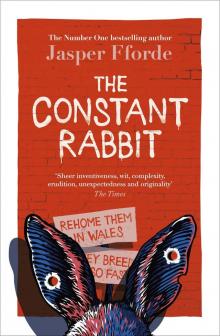 The Constant Rabbit
The Constant Rabbit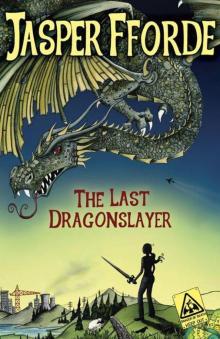 The Last Dragonslayer
The Last Dragonslayer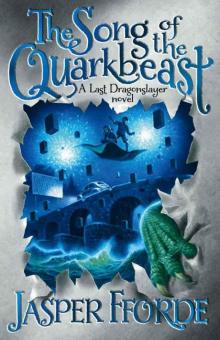 The Song of the Quarkbeast
The Song of the Quarkbeast One of Our Thursdays Is Missing
One of Our Thursdays Is Missing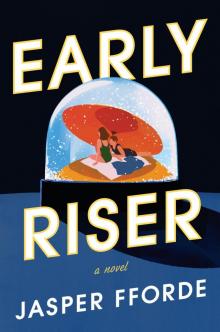 Early Riser
Early Riser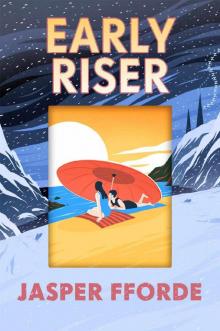 Early Riser_The new standalone novel from the Number One bestselling author
Early Riser_The new standalone novel from the Number One bestselling author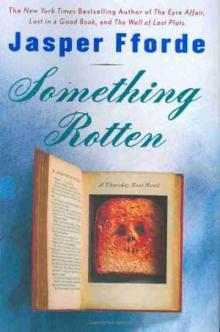 Something rotten n-4
Something rotten n-4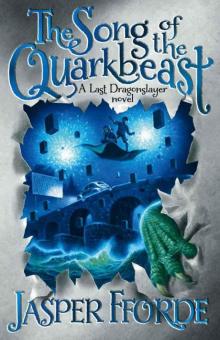 The Song of the Quarkbeast tld-2
The Song of the Quarkbeast tld-2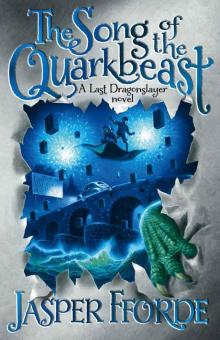 The Song of the Quarkbeast: Last Dragonslayer: Book Two
The Song of the Quarkbeast: Last Dragonslayer: Book Two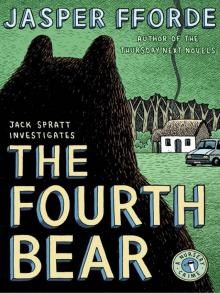 The Fourth Bear nc-2
The Fourth Bear nc-2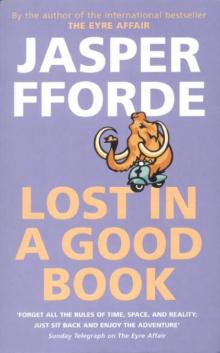 Lost in a Good Book tn-2
Lost in a Good Book tn-2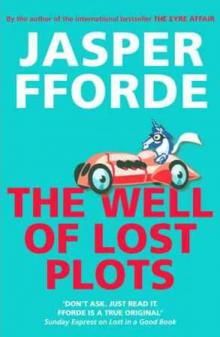 The Well of Lost Plots n-3
The Well of Lost Plots n-3 Thursday Next in First Among Sequels
Thursday Next in First Among Sequels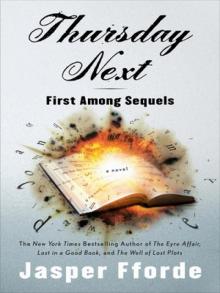 First Among Sequels tn-5
First Among Sequels tn-5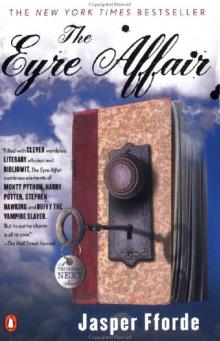 The Eyre Affair tn-1
The Eyre Affair tn-1